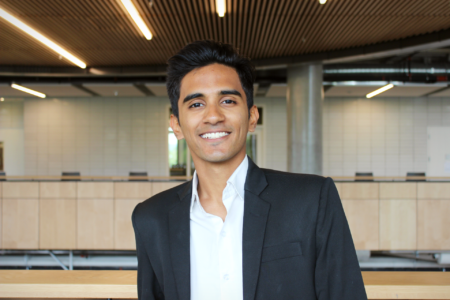
Studying abroad can be equal parts glamorous and equal parts lonely.
It’s living your dream life in an Insta-worth destination while pursuing your academic goals, all while experiencing a new country as a bright-eyed student.
It’s also festivals and celebrations not spent with the people you grew up spending it with because everyone’s home and you’re not.
You might even struggle to make friends — be it through classes, extracurriculars, social media, or even study apps.

Brodahl struggled with making friends during her undergraduate days, and it was something that she had not expected during her time abroad. Source: Klara Brodahl
Social and cultural disconnection are some of the common causes of loneliness among students, as well as homesickness, language struggles, and being lumped together as a minority.
A 2007 study conducted in Australia found that 65% of its participants (international students) have experienced loneliness or isolation in the country, with women (67%) at a higher percentage than men (62%).
And while getting on Bumble and other apps can help ease loneliness, it’s only a short-term solution.
Hailing from Sweden and having undergone her own study abroad journey in the UK, Klara Brodahl knows the feeling well.
Her solution to the problem? Create a study app to counter studying alone and improve the social experience for university students.

Brodahl during her graduation at Queens Mary University of London. Source: Klara Brodahl
From the companionship of family to a stretch of loneliness
Studying abroad was always in the cards for Brodahl — she always knew it would be in the UK, but “what” she would study wasn’t easy to decide.
Before pursuing an undergraduate degree, she took a two-year gap year to determine her career goals. During those two years, her mother started working in tech and introduced her to it.
“My mother said, ‘Klara, maybe you’d want to try tech. You have a passion for maths and problem-solving; maybe this is the path for you.’ So, I tried it and ended up loving it,” says Brodahl.
In 2020, Brodahl enrolled in a BSc in Computer Science with Management programme at Queen Mary University of London.
Moving to London was one of the best choices she had made then. It was not too far from Sweden, the best place to learn English, and the city was filled with people worldwide.
“I wanted to meet different kinds of people and get various perspectives. Plus, the parks are beautiful and green during the summer,” says Brodahl.
Well, she was only half-right — the part of meeting different kinds of people proved to be a challenge.

Brodahl conducted research and found that loneliness and isolation were a common struggle faced by both local and international students. Source: Klara Brodahl
“I thought making friends would be like fate, but it was harder than it should have been,” says Brodahl. “There were obstacles I faced, such as friends living far away from each other.”
Growing up in a close-knit family, the drastic change in lifestyles when she was in London took a toll on her.
In the UK, 72% of international students face loneliness at a moderate level, according to a 2023 study based on the BBC Loneliness Experiment.
In the same year, the UK government reported that 92% of students in the UK experience loneliness, and nearly half of them worry about being judged if they admit to feeling lonely.
It was something Brodahl wasn’t aware of, having believed she was the only one facing this problem. That is until she began her final year project and decided to research this issue.
“Loneliness and isolation at universities are such a big problem, not only in London but other countries too,” she shares.
“And I learnt that I wasn’t alone. I heard stories from friends who graduated, and they were disappointed with their social experience. I researched more and realised there’s a solution to this.”

Students on a study date through StudyBuddy by UNIMATE. Source: Klara Brodahl
Creating a study app for lonely students
“There are so many online tools to make friends, but even with social media, people are still lonely,” says Brodahl. “In-person connection is essential, especially laughing and spending time with them.”
Besides, things can be easily misinterpreted if you’re only communicating online. 55% of our communication comes from body language, 38% comes from our tone of voice, and 7% comes from words themselves, according to Lime Venue Portfolio.
Small interactions or sharing a common goal can increase students’s sense of belonging, which many lack. Honestly, having someone ask you to lend them a pencil or ask you about your day can go a long way.
Still, it is difficult to do. Even if you’re willing to combat loneliness, finding a friend to study with you isn’t easy. For Brodahl, it was a common issue due to “busy schedules.”

StudyBuddy has over 400 users worldwide. Source: Klara Brodahl
The solution? Creating StudyBuddy, a study app for students.
The co-studying platform that makes studying more collaborative, social, and fun allows students to connect with others in real-time for study sessions or social meetups — all while combating loneliness.
In the app, you can browse the map to discover active study sessions around you. Once you have found someone who’s studying the subject you’re interested in, you can connect to chat with them and join the session in person.
You’ll also be able to start your own session and let others join your study space.
This final year project-turned-real-world utility now has over 400 users today and is available worldwide.

Brodahl at Websummit, the world’s largest tech conference. Source: Klara Brodahl
Advice from one entrepreneurial international student to another
For Brodahl, sharing your ideas rather than hiding and protecting them is the best thing an inspiring entrepreneur could do.
“I don’t think it’s the right approach to not talk about their ideas. I understand that many fear others might steal it, but really, people lean more to helping than taking it and making it their own,” she shares.
Talking about what you want to build will also help you build your confidence, especially if you’re starting something abroad, she believes.
It will also help you align your mission better and learn more about yourself.










